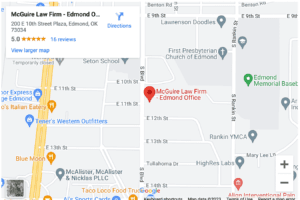Subrogation Attorney in Oklahoma City

Subrogation claims are common in personal injury cases. Health insurance policies contain subrogation clauses.
These clauses allow the company to demand reimbursement for payments of medical bills related to accident claims. Unfortunately, subrogation claims can decrease your compensation in a personal injury claim.
What Does Subrogation Mean?

Subrogation is the right of a party to sue for an action that belongs to another party. The subrogation clause gives your health insurance important rights.
Suppose you do not file a personal injury claim after an accident or injury. Then, your insurance company has the right to pursue a claim against the at-fault party.
Suppose you pursue a personal injury case. In that case, your health insurance provider can demand reimbursement for payments it made related to the injury. You must settle the subrogation claim, or your insurance company could sue you for the amount.
How Do Subrogation Claims Work?
Subrogation claims avoid double recovery. Without subrogation clauses, an injured party could recover twice for the same injury.
For instance, suppose that another driver causes a car accident causing you to sustain several injuries. You submit the medical bills from the accident to your health insurance provider. The health insurance company pays $20,000 in medical bills.
Then, you receive a personal injury settlement from the other driver’s car insurance company. The settlement includes reimbursement for all medical bills. It includes the $20,000 paid by the health insurance company.
However, you did not pay those medical bills. Therefore, if you keep the money, you receive double recovery for the accident and injury. In other words, you profit from the fact that another party injured you.
Instead, your health insurance company notifies you that it intends to exercise its subrogation rights. Then, if you receive any money for your personal injury claim, the company demands reimbursement for the bills it paid.
Do not think a lack of notice means you get out of paying subrogation claims. The terms of your insurance policy might require you to report settlements to the health insurance company.
Furthermore, subrogation clauses typically require you to cooperate with any attempts by the health insurance company to exercise its subrogation rights. Therefore, you cannot waive your rights or release the other party from liability for damages if they are at fault.
Do Subrogation Claims Apply to Medicare and Other Government Assistance Programs?
If your health insurance is provided by Medicaid, Medicare, or other government programs, subrogation rights still apply. You could lose your benefits if you do not comply with subrogation claims. In addition, the health insurance company might file a lawsuit against you seeking a personal judgment for the money owed to the company for subrogation claims.
How Does a Personal Injury Lawyer Help With Subrogation Claims?
Generally, a health insurance company receives notice that medical expenses relate to a personal injury by reviewing the medical records. Doctors and hospitals note when an injury occurred because of an accident. The company flags your records to monitor the claim.
When you settle your personal injury claim, your attorney verifies subrogation claims. The attorney verifies whether the insurance company paid the total amount of the medical bill or a negotiated price for medical services. The company is only entitled to reimbursement for the amount paid to the medical provider.
Oklahoma City personal injury attorneys carefully review settlement agreements. An insurance company for the at-fault party might include a subrogation waiver. The waiver protects the insurance company from claims by your health insurance provider.
Subrogation waivers can violate your health insurance coverage. Therefore, ensuring the settlement agreement does not contain any language that waives subrogation claims is essential.
The Role of an Injury Lawyer
Experienced injury lawyers negotiate payoffs of subrogation claims. Health insurance companies are not required to discount their subrogation claims. Instead, they are entitled to payment in full.
However, a personal injury lawyer might convince the health insurance provider to accept a lower payment. Negotiating payoffs of subrogation claims can put more money in your pocket.
Your accident attorney works to maximize other damages, including non-economic damages and other financial losses. Maximizing each category of damages increases the amount of your personal injury settlement.
Can You Avoid Subrogation Claims?
If your health insurance company pays medical bills associated with your accident, you are unlikely to avoid subrogation claims. However, you can reduce the impact of these claims by keeping careful records of all medical expenses and bills.
Compare the medical bills to your health insurance statements. Note any accounts that have different amounts. Also, document other expenses to maximize the amount you receive for out-of-pocket expenses to maximize recovery amounts.
Schedule a Free Consultation with Our Oklahoma City Personal Injury Lawyers
Before accepting a settlement offer, talk with our Oklahoma City personal injury attorneys. We can help you maximize your settlement and settle your subrogation claim. Contact us at McGuire Law Firm today at (405) 513-5658 to schedule your free consultation.

